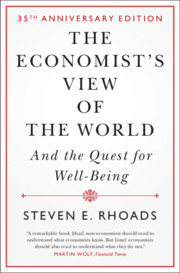Book contents
- More Praise for The Economist’s View of the World
- The Economist’s View of the World
- The Economist’s View of the World
- Copyright page
- Dedication
- Contents
- Preface
- Acknowledgments to the First Edition
- Acknowledgments
- Introduction
- Part I Useful Concepts
- 1 Opportunity Cost
- 2 Marginalism
- 3 Economic Incentives
- Part II Government and Markets, Efficiency and Equity
- Part III The Limits of Economics
- Notes
- Index
2 - Marginalism
from Part I - Useful Concepts
Published online by Cambridge University Press: 24 September 2021
- More Praise for The Economist’s View of the World
- The Economist’s View of the World
- The Economist’s View of the World
- Copyright page
- Dedication
- Contents
- Preface
- Acknowledgments to the First Edition
- Acknowledgments
- Introduction
- Part I Useful Concepts
- 1 Opportunity Cost
- 2 Marginalism
- 3 Economic Incentives
- Part II Government and Markets, Efficiency and Equity
- Part III The Limits of Economics
- Notes
- Index
Summary
Economists dispute the popular wisdom that “anything worth doing is worth doing well.” That’s because of their understanding of the concept of marginalism. Most choices in life are made “at the margin.” We obviously need food and water to live, but, usually, once we have enough of these things, their marginal value – the price we are willing to pay for a little bit more of them – rapidly diminishes.
The insights of marginalism are important to understanding many public debates. Arguments over health spending are a good example. Although we might spend all that is needed to fix a broken leg or save a particular life, much health care spending “on the margin” is not about meeting vital needs. We will weigh the “need” for an extra treatment on our tennis elbow very differently if our cost is a $10 insurance co-pay versus a much higher fee out of pocket.
If we think about marginal cost as economists do, we will use well the time and money we devote to a task, but we will rarely do as much as interested professionals think necessary. How well we do a thing must be weighed against all the other things worth doing.
- Type
- Chapter
- Information
- The Economist's View of the WorldAnd the Quest for Well-Being, pp. 28 - 42Publisher: Cambridge University PressPrint publication year: 2021



